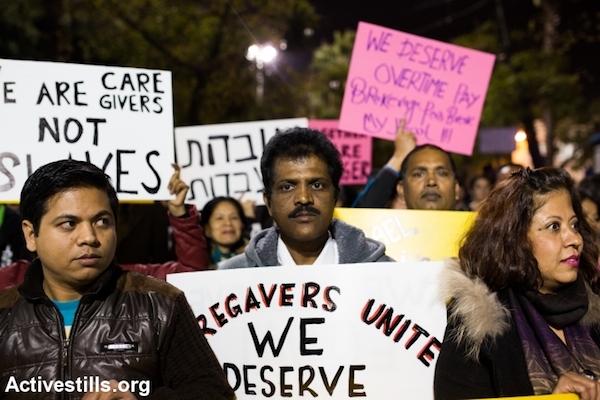The some 60,000 migrant workers who care for Israel’s elderly don’t receive the simplest of labor rights like overtime pay, guaranteed rest hours and vacation, are often locked into a form of debt bondage.
By Jacob Udell

While thousands of asylum seekers filled up Levinsky Park to organize a three-day general strike Saturday night, a smaller group of migrant workers, supported by Israelis and the workers rights organization Kav LaOved, took to the surrounding streets to demand equal rights. The workers were migrant caregivers representing the approximately 60,000 workers from the Philippines, Nepal, India, and elsewhere who live with and care for elderly Israelis.
The host of exploitative practices that caregivers encounter both before and after they arrive to Israel paint an alarming picture of the way migrant workers in Israel are exploitated. Today, migrant caregivers coming to Israel take out loans to pay an average of $8,400 in agency fees to private recruiting agencies in exchange for a work visa. The fees are collected in violation of Israeli law and effectively bind workers to their places of work; a form of debt bondage, recruiting fees prevent caregivers from speaking out against exploitation or mistreatment for fear that will be unable to pay back their loans. One caregiver reported to Kav LaOved that it took her four years to pay back the $10,000 loan she took out to get to Israel, saying, “it’s a sacrifice, so what can you do?”
The workplaces to which caregivers are bound are the homes of elderly Israelis. Given the nature of intensive care for the elderly, caregivers wait on their employers 24 hours a day; yet the vast majority of them only make monthly minimum wage. Isolated from peers and unable to enjoy a life outside of work, caregivers often have requests for sick days and vacation days refused altogether by their employers – indeed, around 30 percent do not take vacation at all. Another caregiver interviewed by Kav LaOved explained the extent of this mistreatment, sharing, “At my last job, I never go out. One and a half years I stay with her, I never go out alone, even for five minutes.” As a result of these sorts of work conditions, caregivers often report physically dangerous levels of exhaustion, depression or nervous breakdowns.
Because of their irregular work arrangements, caregivers are the one labor group in Israel that is excluded from the overtime hours and rest law, following a 2013 Supreme Court decision. This decision, together with the flagrant lack of enforcement by the Economy Ministry in cases of labor rights violations, leaves migrant caregivers with few places to turn to voice their objections to and seek redress for such exploitation and unsustainable work conditions.
The caregivers who led the protest yesterday marched from Levinsky Park to Habima Square to call on the Israeli government to curb these practices. The protest was organized as an initial call for Israel to adopt the International Labor Organization’s Convention 189, known as the Domestic Workers Convention. The convention asserts that the human rights of domestic workers include equal standing before the law, freedom of association with employers, and the prevention of agency fees. It has been ratified in 10 countries thus far, among them Italy and Germany.
It turns out that even those migrant workers who care for Israeli Sabas and Savtas are not spared from discrimination and exploitation common to migrant workers in Israel. One of the caregivers quoted above told Kav LaOved that, despite her work conditions, “I think we take care [of our employers] more than their family because we stay 24 hours with them. We know how they are feeling, what they are saying, what they want.” Caregivers often express a deep sense of care for their employers; the fact that the Israeli government and public cannot do the same for the migrant caregivers themselves is a deep injustice.
Jacob Udell is working at Kav LaOved for the year as a New Israel Fund SHATIL fellow.
Related:
When it comes to migrant workers, Israel’s High Court is all High-Level Babble
Home Field: Visiting agriculture workers in Israel, part 2
